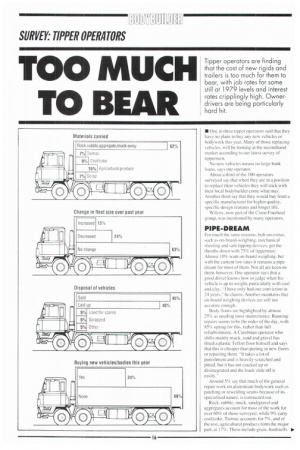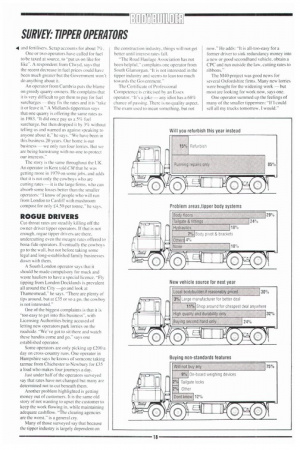TOO MUCH TO BEAR
Page 112

Page 114

If you've noticed an error in this article please click here to report it so we can fix it.
• One in three tipper operators said that they have no plans to buy any new vehicles or bodywork this year. Many of those replacing vehicles, will be looking at the secondhand market according to our latest survey of tippermen.
No new vehicles means no large bank loans, says one operator.
About a third of the 100 operators surveyed say that when they are in a position to replace their vehicles they will stick with their local bodybuilder come what may. Another third say that they would buy from a specific manufacturer for higher quality, specific design features and longer life.
Wilcox, now part of the Crane Fruehauf group, was mentioned by many operators.
For much the same reasons, bolt-on extras. such as on-hoard-weighing. mechanical sheeting and safe tipping devices, get the thumbs down with 75% of tippet-men. Almost 0% want on-board weighing. but with the current low rates it remains a pipedream for most of them. Not all are keen on them, however. One operator says that a good driver knows how to judge when his vehicle is up to weight, particularly with coal and clay. "I have only had one conviction in 24 years." he claims. Another maintains that on-hoard weighing devices are still not accurate enough.
Body floors are highlighted by almost 2514 as needing most maintenance_ R wining repairs seems to be the order of the day, with 85% opting for this, rather than I'M I refurbishment. A Cumbrian operator who shifts mainly muck, sand and gravel has fitted a plastic Teflon floor himself and says that this is cheaper than putting in new floors or repairing them. It takes a lot of punishment and is heavily scratched and pitted, but it has not cracked up or disintegrated and the loads slide off it easily."
Around 517 say that much of the general repair work on aluminium bodywork such as patching or rewelding seams because or its specialised nature, is contracted out.
Rock. rubble, muck. sand/gravel and aggregates account for most of the work for over 60% of those surveyed, while 9% carry coal/coke. Tarmac accounts for 7%. and of the rest, agricultural products form the major part, at 17%. These include grain, feedstuffs
and fertilisers. Scrap accounts for about .
One or two operators have called for fuel to be taxed at source, to -put us on like for like-. A respondent l'rorn Clwyd, says that the recent decrease in fuel prices could have been much greater but the Government won't do anything about it.
An operator from Cumbria puts the blame on greedy quarry-owners. He complains that ir is very difficult to get them to pay for fuel surcharges --they fix the rates and it is "take it or leave it." A Midlands tipperman says that one quarry is offering the same rates as in 1983, "It did once pay us a 5% fuel surcharge, but then dropped it by 3% without telling us and warned us against speaking to anyone about it," he says. We have been in this business 20 years. Our home is our business — we only run four lorries. But we are being hamstrung with no-one to protect our interests.
The story is the same throughout the UK. An operator in Kent told CM that he was getting more in 1979 on some jobs, and adds that it is not only the cowboys who are cutting rates — it is the large firms, who can absorb some losses better than the smaller operators:" know of people who will run from London to Cardiff with mushroom compost for only £4.50 per tonne." he says.
Cut-throat rates are steadily killing off the owner-driver tipper operators. If that is not enough, rogue tipper drivers are there, undercutting even the meagre rates offered to bona-fide operators. Eventually the cowhoys go to the wall, but not before taking some legal and long-established family businesses down with them.
A South London operator says that it should be made compulsory for muck and waste hauliers to have a special licence. "Fly tipping from London Dock lands is prevalent all around the City —go and look at Thamesmead," he says. "There are plenty of tips around, but at £35 or so a go, the cowboy is not interested."
One of the biggest complaints is that it is -too easy to get into this business". with Licensing Authorities being accused ot' letting new operators park lorries on the roadside. "We've got to sit there and watch these bandits come and go." says one established operator.
Some operators are only picking up £200 a day on cross-country runs. One operator in Hampshire says he knows of someone taking tarmac from Chichester to Newbury for £35 a load who makes four journeys a day.
Just under half of the operators surveyed say that rates have not changed but many are determined not to cut beneath them.
Another problem highlighted is getting money out of customers. It is the same old story of not wanting to upset the customer to keep the work flowing in, while maintaining adequate cashflow. "The clearing agencies are the worst." is a general cry.
Many of those surveyed say that because the tipper industry is largely dependent on the construction industry, things will not get better until interest rates fall.
"The Road Haulage Association has not been helpful," complains one operator from South Glamorgan. "It is not interested in the tipper industry and seems to lean too much towards the Government," The Certificate of Professional Competence is criticised by an Essex operator. "It's a joke — any idiot has a 68% chance of passing. There is no quality aspect. The exam used to mean something. but not
now." He adds: -It is all-too-easy for a former driver to sink redundancy money into a new or good secondhand vehicle, obtain a CPC and run outside the law, cutting rates to ribbons."
The M40 project was good news for several Oxfordshire firms. Many new lorries were bought for the widening work — but most are looking for work now, says one.
One operator summed up the feelings of many of the smaller tippennen: "If I could sell all my trucks tomorrow, I would."
























































































































